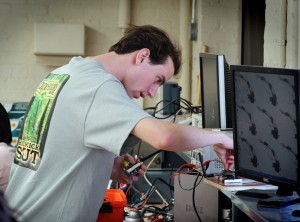
Student Rocco Disanto works on his project in Professor Richard Goldberg’s class. (photo by Dan Sears)
Carolina undergraduates are inventing devices to tackle real-world problems through biomedical engineering. The opportunity to study in one of the fastest-growing job fields evolved through a partnership between UNC’s College of Arts and Sciences and the School of Medicine.
“Biomedical engineering is an exciting new discipline that applies the rigorous methods of physics, chemistry, mathematics and engineering to solve important and urgent biological and biomedical problems,” said Nancy Allbritton, UNC Debreczeny Distinguished Professor of Chemistry, who chairs the joint biomedical engineering department.
In their senior year, UNC biomedical engineering students must take a design course to apply what they have learned. They tour clinics at UNC Hospitals to get ideas for medical problems that could be solved by new technology. In addition, students meet with individuals in the community who have disabilities to get ideas for custom technology that helps them become more independent.
For example, in 2013, students developed an Android tablet app that, when attached to a child’s walker, provided a musical feedback loop for a preschooler with a disability who had been reluctant to practice walking. Students wrote and copyrighted the software and are in the process of making the system available to people in similar situations.
Some students collaborating at the Jaycee Burn Center at UNC Health Care developed a device that helps patients perform vital stretching exercises independently, freeing the physical therapist to see more patients.

Chemistry professor Nancy Allbritton is the chair of the biomedical engineering department. (photo by Lars Sahl)
Another group of students won two technology design awards for developing a Braille training toy for children. This year, the students are trying to market their idea.
At the end of the school year, a joint UNC/N.C. State biomedical engineering design symposium lets students showcase their completed projects to industry leaders and investors.
“Students can do show-and-tell in front of people who work for companies where our students might look for jobs,” said Allbritton.
Biomedical engineering students work closely with faculty on their research and have access to real-life experiences that will enhance their careers, said Allbritton. Students gain experience through participating in multidisciplinary teams, just as they will in the working world.
Students and faculty are also turning their ideas into start-up companies that hold the potential to hire others. That can fuel the state’s economy, she added.
The department of biomedical engineering (BME) began as a joint graduate program between UNC’s School of Medicine and N.C. State and recently expanded into UNC’s College of Arts and Sciences to further develop the undergraduate degree program in Chapel Hill. (N.C. State has a separate undergraduate BME degree.)
Carolina students currently receive a bachelor of science degree in applied sciences.
US News & World Report recently cited BME as the No. 1 new college major with a future, and The New York Times said it was the No. 1 field “where the jobs are.”
The U.S. Department of Labor has reported that the number of BME jobs has been increasing at close to double the rate for all other jobs combined. Positions often start at about $80,000 a year.
Check out a UNC video highlighting student BME projects that helped an accomplished kayaker who was born with spina bifada, a third-grader with autism, and others.
[ Story by Nancy E. Oates ]
